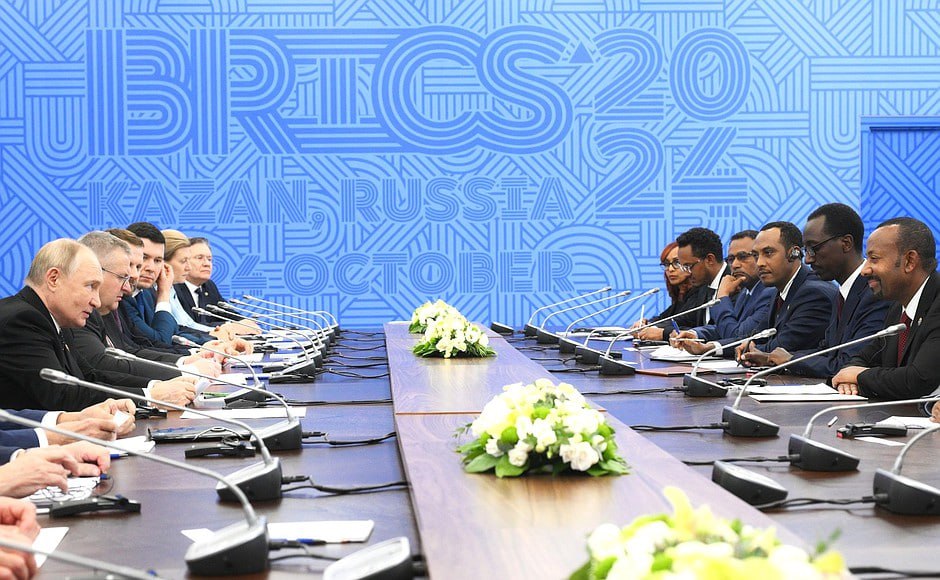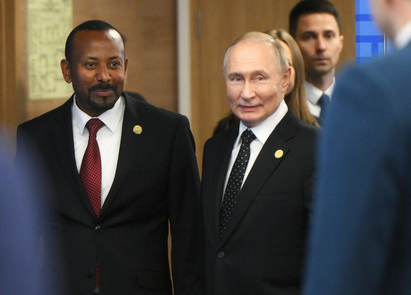
The three-day BRICS summit in Russia’s Kazan city affirmed the grouping’s fast-growing global influence over the last two decades.
The summit of Brazil, Russia, India, China, and South Africa (BRICS) has now expanded to include five additional members: Egypt, Ethiopia, Iran, Saudi Arabia, and the UAE.
Last week's BRICS summit is Egypt’s first as a member, following its joining in January amid a crippling economic crisis in the Arab world’s most populous nation.
The 2024 BRICS summit held from October 22 to 24 demonstrated the group’s rapid expansion, increasing its heft as a force towards a new world order.
The summit provided a platform for member countries to discuss plans to deepen financial cooperation and develop alternatives to Western-dominated payment systems.
Since its inception, BRICS has become a major political force, building on its desire to create a counterweight to Western influence in global institutions.
Last week’s BRICS meeting was the first summit in the expanded format attended by leaders from 35 states and six international organizations, including the UN Secretary General as well as Asian, African and Latin American countries.
BRICS has transformed into what analysts say is an indispensable framework for emerging centres of power, and it keeps attracting more and more countries as a response to global turbulence and uncertainty.
"We succeeded quite well despite all doubts regarding differences within the expanded membership. Because our biggest value is the sincere dedication to find amicable solutions and common ground when it comes to difficult issues," Russia said in a statement.
Mosco says the new world order driven by BRICS focuses on practical cooperation and international coordination.
Russian President Vladimir Putin said in Kazan that all countries joining the bloc “share similar aspirations and values and a vision of new democratic global order.”
Putin said that the transition to a more just international system is not easy, however, as its development is being hampered by forces he said whose thinking and actions continue to be aimed at dominating everything and everyone.
“Under the guise of a rule-based order they are imposing on the world, they are attempting to contain growing competition and prevent the independent development of countries in Africa, Asia and Latin America that they cannot control,’’ he said.
“Russia, like all BRICS countries, is open to cooperation with all countries of the Global South and East to promote inclusive and sustainable development and ultimately build a better world.”
Russia says BRICS respects sovereign equality, diversity, mutual interests and mutual benefit which offers a diversified, inclusive and consensus-based cooperation.
BRICS works with more than 80 sectoral tracks structured into three baskets: policy and security, economy and finance and humanitarian and cultural ties.
It is free from domination and rejects unilateral sanctions, double standards or interference in domestic affairs, its anchor philosophy.
The cooperation is based on legitimate national interests and the central role of the United Nations.
Putin told the BRICS summit that the UN must retain its central role in efforts to maintain peace and security and facilitate sustainable and steady development, but called for radical reforms
“To ensure the effective functioning of the UN in the future, we believe it is important to adapt its structures to the realities of the 21st century, expanding the representation of countries of Asia, Africa and Latin America, including those whose leaders are present here, in the Security Council and other key international bodies,” he said.
This step, diplomas argue, will definitely multiply the value of BRICS’ diversified partnership and add to the forum's global influence, which is now making a decisive contribution to global food and energy security.
To ensure seamless cooperation, the Summit decided to work
out an investment platform by strengthening the New Development Bank and approved
around 100 infrastructure projects worth USD 35 billion as the key institution
for the sustainable development of its shareholders.
At the BRICS summit, Egyptian president Abdel Fattah al-Sisi held talks with his Russian counterpart President Vladimir Putin.
In statements aired by Russian news agencies, Sisi praised “the development of bilateral relations” between Egypt and Russia in recent years, in particular, Moscow’s “effective contribution to (Egypt’s) national projects”.
Chief among them, Sisi said, is Egypt’s first nuclear power plant at El-Dabaa on the Mediterranean coast, built by Russia’s state atomic energy corporation Rosatom.
Putin during the meeting called Egypt a “long-term and reliable partner of Russia” and said “Egypt accounts for about a third of all trade turnover between Russia and Africa”, according to Russian media.
During his meeting with Putin, Sisi said Egypt supports BRICS becoming “a platform capable of confronting the repercussions of international crises”






